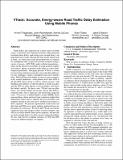VTrack: Accurate, energy-aware road traffic delay estimation using mobile phones
Author(s)
Thiagarajan, Arvind; Ravindranath, Lenin; LaCurts, Katrina Leigh; Madden, Samuel R.; Balakrishnan, Hari; Toledo, Sivan; Eriksson, Jakob; ... Show more Show less
DownloadBalakrishnan_VTrack accurate.pdf (1.720Mb)
OPEN_ACCESS_POLICY
Open Access Policy
Creative Commons Attribution-Noncommercial-Share Alike
Terms of use
Metadata
Show full item recordAbstract
Traffic delays and congestion are a major source of inefficiency, wasted fuel, and commuter frustration. Measuring and localizing these delays, and routing users around them, is an important step towards reducing the time people spend stuck in traffic. As others have noted, the proliferation of commodity smartphones that can provide location estimates using a variety of sensors---GPS, WiFi, and/or cellular triangulation---opens up the attractive possibility of using position samples from drivers' phones to monitor traffic delays at a fine spatiotemporal granularity. This paper presents VTrack, a system for travel time estimation using this sensor data that addresses two key challenges: energy consumption and sensor unreliability. While GPS provides highly accurate location estimates, it has several limitations: some phones don't have GPS at all, the GPS sensor doesn't work in "urban canyons" (tall buildings and tunnels) or when the phone is inside a pocket, and the GPS on many phones is power-hungry and drains the battery quickly. In these cases, VTrack can use alternative, less energy-hungry but noisier sensors like WiFi to estimate both a user's trajectory and travel time along the route. VTrack uses a hidden Markov model (HMM)-based map matching scheme and travel time estimation method that interpolates sparse data to identify the most probable road segments driven by the user and to attribute travel times to those segments. We present experimental results from real drive data and WiFi access point sightings gathered from a deployment on several cars. We show that VTrack can tolerate significant noise and outages in these location estimates, and still successfully identify delay-prone segments, and provide accurate enough delays for delay-aware routing algorithms. We also study the best sampling strategies for WiFi and GPS sensors for different energy cost regimes.
Date issued
2009-11Department
Massachusetts Institute of Technology. Computer Science and Artificial Intelligence Laboratory; Massachusetts Institute of Technology. Department of Electrical Engineering and Computer ScienceJournal
Proceedings of the 7th ACM Conference on Embedded Networked Sensor Systems
Publisher
Association for Computing Machinery
Citation
Thiagarajan, Arvind et al. “VTrack: accurate, energy-aware road traffic delay estimation using mobile phones.” Proceedings of the 7th ACM Conference on Embedded Networked Sensor Systems. Berkeley, California: ACM, 2009. 85-98.
Version: Author's final manuscript
ISBN
978-1-60558-519-2